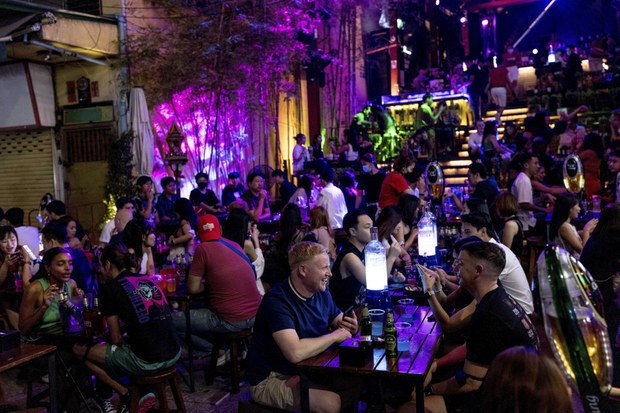Thee Jenpiboon, a Chiang Mai bar owner, has a problem that keeps him awake – literally.
Under a policy implemented a year ago by Thailand’s government, his establishment and other nightspots in Chiang Mai and four other areas can extend their operating hours and stay open until 4 a.m.
The five locales – Chiang Mai, Bangkok, Phuket, Chonburi, and Koh Samui in Surat Thani province – are famous for their nightlife and magnets for foreign tourists and their dollars.
The government implemented the policy in December 2023 to allow nightspots to stay open another two hours beyond the usual 2 a.m. closing time in order to help with Thailand’s post-Covid economic recovery.
But a year on, some local entrepreneurs like Thee and residents are questioning the policy’s economic justification and whether the government is prioritizing profit over public safety.
While large bars in these areas – which often cater to foreigners –would benefit from this policy, Thee thinks smaller establishments that mainly serve local patrons, like his, would not benefit from it.
“For small venues like mine, it’s not worth staying open until 4 a.m. There’s no guarantee of more customers,” Thee told BenarNews.

The government’s move to extend the operating hours of nightlife venues in selected areas may not be reaping economic benefits as its proponents had hoped for, according to a researcher studying the policy.
“Some operators say the policy isn’t worth it because of higher costs and uncertain customer turnout. They don’t see extended hours as a key factor attracting more tourists,” Woradul Turarak, a researcher on a project assessing the impact of extended nightlife hours, told BenarNews.
Thee shares a similar view.
“If we [continue to] extend the hours to 4 a.m., we’ll face higher expenses for staff wages, raw materials, and electricity,” he said. “Local drinkers are usually gone by 1 a.m. anyway.”

To be fair, the government did consult with several business groups before instituting the policy.
In 2022, as the nation’s economy was struggling from ripple effects of the COVID-19 pandemic, two business groups in Bangkok and Phuket called for extending the operating hours at nightlife venues. The measure, they reasoned, would help stimulate the tourism industry – an engine of the Thai economy – and lure foreign tourists back.
Thailand aims to receive as many as 35 million international visitors this year compared with 28 million visitors in 2023, according to the tourism ministry.
Public safety costs
Some local entrepreneurs and residents, however, argue that the extended hours for nightspots may undermine measures to promote road and public safety in Thailand, a country notorious for traffic fatalities.
The study that Woradul is working on compared six months of accident data before and after the policy’s implementation. In Chiang Mai province, the number of injuries from road accidents increased by 947 cases and the number of deaths rose by 20 during that period.

During the first week of the policy’s implementation, a drunk tourist caused a driving accident at 4 a.m. in Chiang Mai, killing one worker and seriously injuring two others.
In November, another drunk tourist – in Pattaya – severely injured a street cleaner during a driving incident at 6 a.m.
Drunk driving was already a persistent problem in the country, Woradul pointed out.
“This policy sends the wrong signals. It not only increases accident rates in pilot areas but also complicates efforts by multiple agencies to reduce drunk-driving incidents,” he said.
“Illegal venues might also take advantage of this policy to operate beyond legal hours, leading to more incidents such as fights and accidents, particularly after 2 a.m. This makes managing drunk-driving cases even more challenging,” Woradul also said.
Last year, 624 foreign tourists died in road accidents, while nearly 22,900 others were injured, according to the Thai Road Safety Center, a government agency.
According to one government minister, the policy doesn’t necessarily undermine public safety.
“If everything is organized, everyone participates and takes social responsibility, we [could] give people the opportunity to earn their livelihood as much as possible,” said Anutin Charnvirakul, deputy prime minister and interior minister.
“If there is drunk driving, [violators] must be prosecuted according to the law,” he told reporters on Dec. 19.
But the policy may exacerbate various risks, according to Woradul.
“Extending bar hours to 4 a.m. undeniably increases the risk of accidents, not just for drinkers but also for nightlife workers who have to work longer hours. Fatigue adds another layer of danger when they travel home,” he said.
Thee, the Chiang Mai bar owner, agrees.
“[Extending the operating hours] until the early morning would reduce rest time for both myself and my staff, worsening the already poor quality of life for those working in nightlife,” the 41-year-old pub owner said.
‘Baffling’
With New Year’s celebrations to usher in 2025 happening very soon, some Thais fear the policy may lead to more road accidents.
From Dec. 29, 2023 to Jan. 2, 2024, there were 1,839 accidents on the country’s roads, with 212 deaths, according to government figures.
“To ensure everyone’s safety during the New Year, a time of celebration, we urge people to drink at home to reduce accidents,” Deputy Prime Minister Prasert Chantraruangthong said during a Dec. 19 committee meeting.

Some Thais expressed their confusion over the government’s measures.
“It’s baffling. On the one hand, the government wants us to stay safe at home, but on the other, they’re encouraging late-night celebrations with extended bar hours,” Suriyan Kantawong, a 44-year-old nightlife patron in Chiang Mai, told BenarNews.
“It feels like stricter laws are only for locals, forcing us to celebrate at home, while extended bar hours cater to foreigners who can drink freely.”
www.facebook.com/tcijthai
Tags






